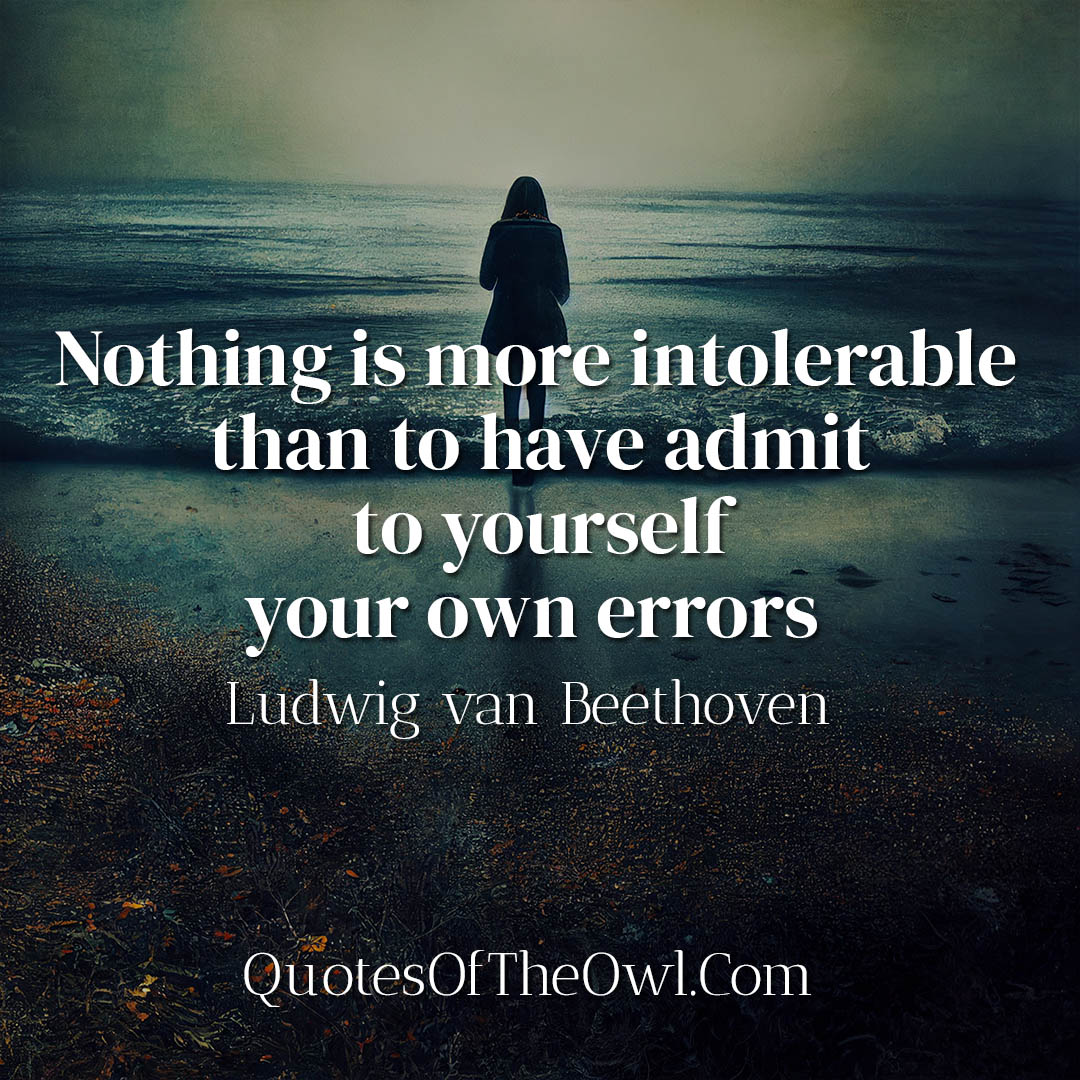Nothing is more intolerable than to have admit to yourself your own errors – Beethoven’s Quote Meaning
Ludwig van Beethoven, one of the most renowned composers in history, left behind not just beautiful music but also profound wisdom. Among his many profound quotes, one stands out: “Nothing is more intolerable than to have to admit to yourself your own errors.” In this article, we delve into the meaning and significance of this quote and explore how embracing our mistakes can lead to personal growth, creativity, and resilience.
Understanding Beethoven’s Quote
The Context of Beethoven’s Life
Beethoven’s life was filled with both triumphs and tribulations. He faced numerous challenges, including hearing loss, personal struggles, and societal pressures. His quote reflects the inner battles he might have faced, as he often grappled with his own imperfections as a musician and as a human being.
Interpretation of the Quote
At its core, Beethoven’s quote highlights the difficulty we experience when acknowledging our own errors and imperfections. It speaks to the human tendency to resist admitting mistakes, perhaps out of fear of judgment or failure. Beethoven, through this quote, urges us to confront our errors honestly, as it is the only way to overcome them.
Acknowledging Our Mistakes
Admitting our mistakes requires courage and humility. It is essential to understand that making mistakes is a natural part of the learning process and an inherent aspect of being human. By accepting our fallibility, we open doors to personal growth and development.
Embracing Imperfections
Overcoming the Fear of Error
The fear of making mistakes can be paralyzing, preventing us from taking risks and embracing new challenges. However, history’s greatest achievements often emerge from a series of failures. Embracing our imperfections allows us to step out of our comfort zones and pursue excellence.
The Importance of Self-Reflection
Self-reflection is a powerful tool for personal growth. By analyzing our actions and decisions, we gain valuable insights into our strengths and weaknesses. Beethoven’s quote encourages us to engage in introspection and use it as a means to improve ourselves continually.
Learning and Growth
The Role of Errors in Personal Development
Errors and failures present invaluable learning opportunities. Each mistake provides a chance to refine our skills and knowledge, ultimately leading to personal growth. Embracing mistakes as part of the learning process enables us to evolve and become better versions of ourselves.
Cultivating a Growth Mindset
The concept of a growth mindset, popularized by psychologist Carol Dweck, aligns perfectly with Beethoven’s quote. A growth mindset emphasizes viewing challenges and failures as opportunities for learning and improvement. When we adopt this perspective, we develop resilience and determination.
Creativity and Innovation
How Errors Foster Creativity
Creative endeavors often involve experimentation, and with experimentation comes the possibility of errors. Artists, musicians, writers, and innovators draw inspiration from their mistakes, allowing them to refine their craft and create exceptional works.
Celebrating Failures as Stepping Stones
Many groundbreaking discoveries and inventions were made possible by acknowledging and learning from failures. Beethoven’s quote reminds us that failures are not dead-ends but stepping stones towards achieving greatness.
Acceptance and Resilience
Embracing Vulnerability and Resilience
Acknowledging errors requires vulnerability, but it also builds resilience. When we confront our mistakes with courage, we develop the strength to face future challenges with a positive and determined mindset.
Gaining Strength from Admitting Errors
Admitting our errors fosters self-awareness and emotional intelligence. It allows us to take ownership of our actions and demonstrate integrity, ultimately leading to personal empowerment.
Conclusion
Beethoven’s quote, “Nothing is more intolerable than to have to admit to yourself your own errors,” serves as a poignant reminder of our shared human experience. Embracing our mistakes and imperfections can lead us to profound personal growth, creativity, and resilience. By acknowledging our errors, we open ourselves to new possibilities and pave the way for a more enriched and fulfilling life.
Recommended Audio CD: Boris Giltburg (Artist), Ludwig van Beethoven (Composer) : Complete Piano Sonatas
Discover Beethoven’s timeless wisdom and musical genius through his inspiring quotes!

